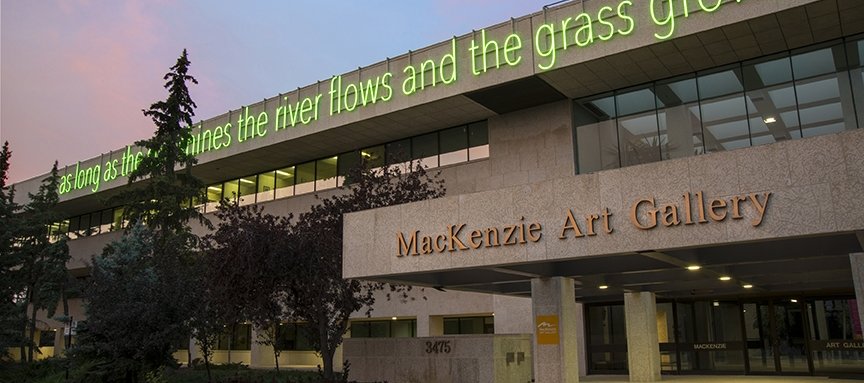
MacKenzie Art Gallery Faces IDEA Head On
In this issue
 Engage - Volume 13, Issue 1, Fall 2022
Engage - Volume 13, Issue 1, Fall 2022
Related Programs
The MacKenzie Art Gallery (MAG) isn’t shy about its outward facing resolve to address inclusion, diversity, equity, and accessibility (IDEA) concerns. The 2018 installation of Duane Linklater’s Kâkikê / Forever on the front of the building, which reads “as long as the sun shines the river flows and the grass grows” – words pulled from the Treaty making process – are evidence of that.
But in 2020, this resolve became more internal. An equity task force was formed, a move that Caitlin Mullan, head of strategic initiatives, says was made, in part, because COVID had brought forward just how much can happen when change becomes non-negotiable.
“Recognizing that there are a lot of other structural issues that affect everybody. It’s not that they were being ignored, but they weren’t being given quite as much priority. And, we wanted to take the opportunity to really sit down and, respond to racism and sexism, ableism, homophobia and other forms of oppression that harm countless people all the time.”
But that look inward doesn’t mean that the MAG isn’t staying publicly accountable. The MAG staff has worked with organizations and companies such as Future Ancestors (a Black-owned and youth-led consulting group), Ivy + Dean Consulting, Listen to Dis’ Community Arts, and Affective Consulting, as well as updated its vision and values on its website to reflect their short, medium, and long-term progress. For Mullan and the MAG team, keeping that level of visibility on the process is an acknowledgement that working towards equity is a journey that never ends and that the gallery, with its long history, has a large part to play.
“I think that, as one of the largest art institutions in the province, we have a responsibility to not only do this work, but to also share that we’re doing it so that it’s visible to other arts organizations and other businesses,” says Mullan. “It’s really important for us to be thinking that way, because the tendrils do spread out, there are little ripples, and then there are big ripples. The more that we do this work, the more we’re approached by organizations who have similar values and similar goals, or the more other organizations might feel that they can trust us.”
Some of MAG’s long-term goals include, “significant progress after long-term repatriation of all objects in the collection that were obtained unethically or illegally,” as well as “to embrace and expand our educational role on diversity in gender expression and identity in sexuality.”
Mullan’s advice for others looking to take meaningful actions on these sorts of initiatives is to understand that change can be big, or small, but it will need to be ongoing in order to be effective.
“This isn’t work that can be done over a year, it’s not work that can be done over five years,” she says. “It’s something you’ve got to continuously work at, and be open to learning about, and understanding that it’s just always going to be something that you need to think about and put resources towards as an organization.”
The MAG receives Annual Global Funding from Sask Lotteries.

